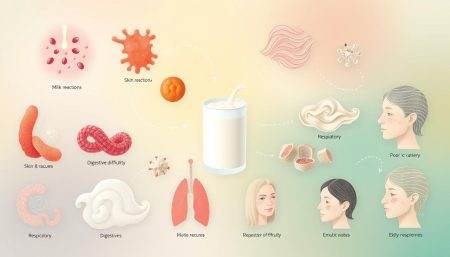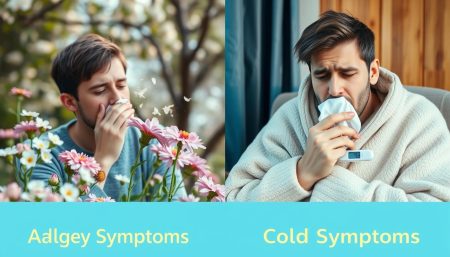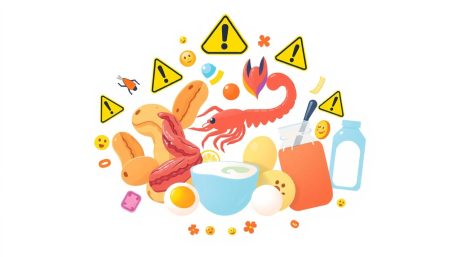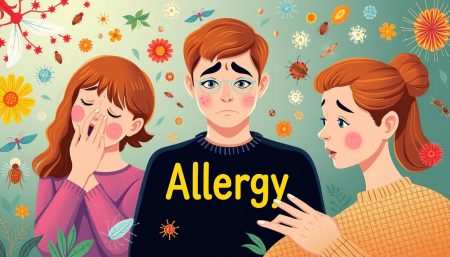Millions face the challenge of managing allergies every year. They look for ways to feel better and prevent symptoms. Often, it starts with noticing small changes like sneezing, sniffles, or rashes.
These signs mean allergy season is here or you’ve been exposed. Knowing about all allergy symptoms can help you feel more comfortable and in control.
For those dealing with sneaky symptoms, managing allergies is more than just having tissues. It’s about taking steps to prevent allergies and finding effective ways to feel better. This article aims to guide you through the world of allergies.
Spotting early signs of common allergies is important for your health. It helps you act fast and prevent symptoms from getting worse. We’ll explore how to prevent and manage allergies, helping you take charge of your health.
Key Takeaways
- Identifying common allergy symptoms is essential for timely and effective intervention.
- Knowledge of allergies aids in developing robust allergy management plans.
- Allergy prevention can significantly reduce the frequency and severity of symptoms.
- Understanding various allergy relief measures is crucial to improving quality of life.
- Awareness of symptom patterns helps to differentiate between allergies and other conditions.
Allergy Symptoms Overview
Knowing about allergy symptoms is key to handling reactions to allergy triggers. These signs can range from mild to severe. They show how our body reacts to things it thinks are threats, even if they’re not.
Allergy symptoms might include sneezing, itchy eyes, and a runny nose. But, environmental allergies can cause more serious issues. For example, people might have asthma attacks or severe skin reactions because of certain allergens around them.
To manage these symptoms, it’s vital to find out what allergy triggers are causing them. The chart below gives a clear view of how different things in our environment can make allergies worse.
| Allergen | Common Symptoms | Severe Symptoms |
|---|---|---|
| Pollen | Nasal congestion, Sneezing | Asthmatic reactions |
| Pet Dander | Itchy eyes, Cough | Respiratory distress |
| Mold | Skin rash, Throat irritation | Severe allergic reactions |
| Dust Mites | Runny nose, Itchy skin | Chronic sinusitis |
Understanding allergy symptoms and environmental allergies helps us treat them better. By learning about common and severe symptoms, and the allergy triggers that cause them, we can make a safer, healthier space for those with allergies.
Understanding the Different Types of Allergies
Knowing about allergies is the first step to managing them. Allergies happen when our immune system overreacts to things that don’t harm us. The most common types are food allergies, seasonal allergies, and allergies caused by long-term exposure to certain places.
Food allergies occur when our immune system sees a food protein as dangerous. These reactions can be mild or very serious. Common culprits include nuts, dairy, and shellfish.
Seasonal allergies, also known as hay fever, are caused by pollen from trees, grasses, and weeds. They make us sneeze, have a runny nose, and itchy eyes. These symptoms happen mainly when these plants are pollinating.
Managing these allergies often means using allergy medications. These can be over-the-counter antihistamines, decongestants, or prescription drugs. The choice depends on the allergy’s severity and type.
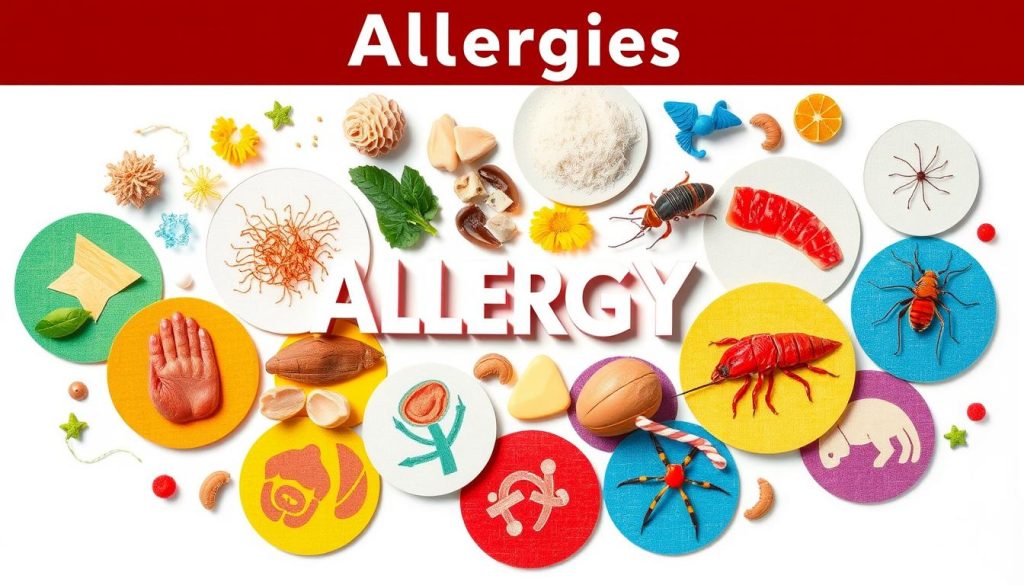
| Allergy Type | Common Triggers | Typical Symptoms | Medication Options |
|---|---|---|---|
| Food Allergies | Nuts, Dairy, Shellfish | Hives, Swelling, Anaphylaxis | Epinephrine, Antihistamines |
| Seasonal Allergies | Pollen, Mold | Sneezing, Itchy Eyes, Congestion | Nasal Steroids, Decongestants |
| Environmental Allergies | Dust Mites, Pet Dander | Red Eyes, Cough, Asthma Flare-ups | Leukotriene Modifiers, Allergy Shots |
To figure out what kind of allergy you have and what medication to use, see an allergist. They can give advice based on tests and your health history.
Recognizing Seasonal Allergies Symptoms
As the seasons change, so do the triggers of seasonal allergies. Each season brings its own challenges for those seeking relief and prevention. Knowing these changes can help manage symptoms better.
Spring-Triggered Allergies
In spring, tree pollens are the main culprits. They can cause sneezing, nasal congestion, and itchy eyes. These are common signs of seasonal allergies.
Summer Allergies and Pollen
Grass pollen is the main allergen in summer. The warm and humid climate also boosts mold growth. This adds more allergens to the environment.
Autumn Allergies: Ragweed and Others
Autumn brings ragweed pollen, a strong trigger for many. This time also sees mold spores in fallen leaves and damp conditions. This increases allergen exposure.
Winter Allergies and Indoor Triggers
In winter, indoor allergens like pet dander, dust mites, and molds become more common. The cold weather means more time indoors, increasing exposure to these irritants.
| Season | Common Allergens | Symptoms | Prevention Tips |
|---|---|---|---|
| Spring | Tree Pollen | Itchy eyes, sneezing, nasal congestion | Keep windows closed, use air purifiers |
| Summer | Grass Pollen, Mold | Nasal congestion, itchy throat | Mow lawns regularly, reduce indoor humidity |
| Autumn | Ragweed Pollen, Mold Spores | Runny nose, watery eyes | Clear fallen leaves promptly, use a dehumidifier |
| Winter | Dust Mites, Pet Dander | Sneezing, coughing | Wash bedding in hot water, vacuum regularly |
Understanding seasonal patterns and allergens is key for effective prevention and relief. This knowledge helps reduce symptoms and improves life quality for those with seasonal allergies.
Identifying Food Allergy Signs
It’s key to know the signs of food allergies for good allergy management. Food allergies can cause anything from mild skin issues to serious breathing problems. If you think you have a food allergy, getting allergy testing is the first step. It helps find out what you’re allergic to and how to deal with it.
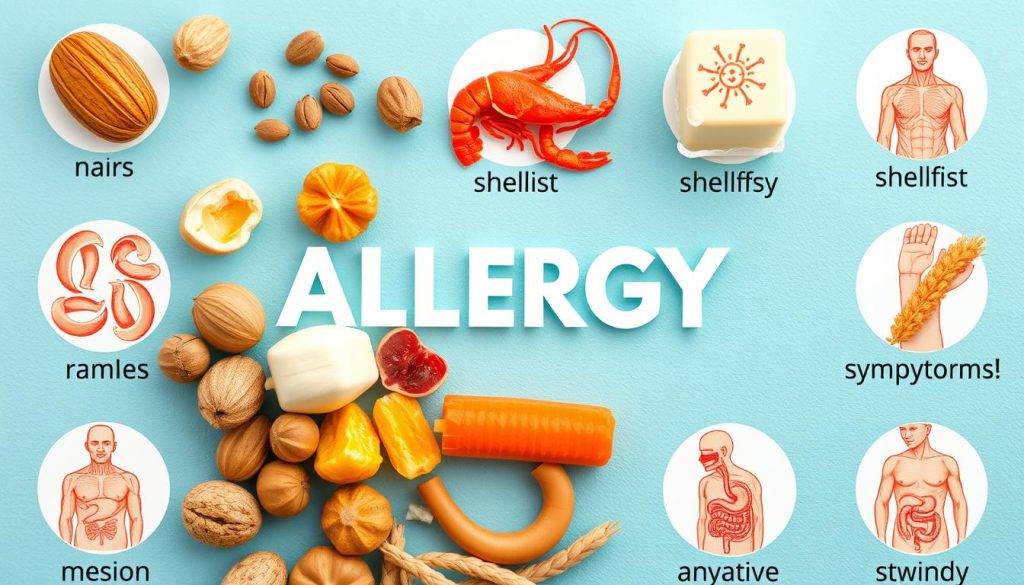
- Hives or skin rash
- Nausea, vomiting, or diarrhea
- Difficulty breathing
- Swelling of the lips, tongue, or throat
- Dizziness or lightheadedness
Spotting these signs early can stop bigger health problems. Food allergies can really affect your life, making allergy management a must.
If you have a food allergy, here’s what to do:
- Avoid known allergens
- Keep emergency medication with you always
- Teach others how to help in an emergency, showing the need for allergy management
Getting help from doctors about allergy testing and care plans is smart. Being ready and knowing what to do helps a lot with food allergies.
Environmental Allergies and Their Signs
Living with environmental allergies can really affect your life. These allergies can be caused by things like pet dander, mold, and dust mites. They can lead to symptoms that make everyday tasks hard. Knowing these signs is key to preventing and treating allergies.
Pet Dander Allergy Indicators
People allergic to pet dander might sneeze, have a runny nose, itchy eyes, or even trouble breathing. Pets are loved by many, so it’s important to find ways to manage these reactions. This helps keep life with pets enjoyable.
Mold Allergy Manifestations
Mold spores can cause allergies all year, but more in warm, moist weather. Symptoms include coughing, watery eyes, and itchy skin. To prevent mold allergies, keep indoor humidity low and ensure good air flow.
Dust Mite Allergy Symptoms
Dust mites live in household dust and can cause allergies. They might make you sneeze, feel congested, or have a postnasal drip. Cleaning often and using allergen-proof bed covers can help reduce dust mite exposure.
| Allergen | Common Symptoms | Prevention Tips |
|---|---|---|
| Pet Dander | Sneezing, Itchy Eyes | Regular pet grooming, air purifiers |
| Mold | Coughing, Watery Eyes | Maintain low humidity, proper ventilation |
| Dust Mites | Congestion, Postnasal Drip | Use allergen-proof bed covers, vacuum regularly |
By recognizing the signs of environmental allergies and using prevention strategies, people can find relief. This improves their well-being and makes daily activities easier and more enjoyable.
Allergies Symptoms in Children vs Adults
Allergy symptoms can look very different in kids and adults. This affects how we find out what’s wrong and how we treat it. It’s key to spot seasonal allergies and food allergies early in kids.
Kids might get skin rashes, cough, or feel really itchy from things like pollen or food. Adults often get worse nasal problems or even sinusitis along with their usual allergies. Knowing these differences helps us treat them better.
How kids and adults react to allergens is also different. Kids’ immune systems are still growing. So, their reactions can be stronger or change as they get older. Adults usually have more steady symptoms, but can still get new allergies.
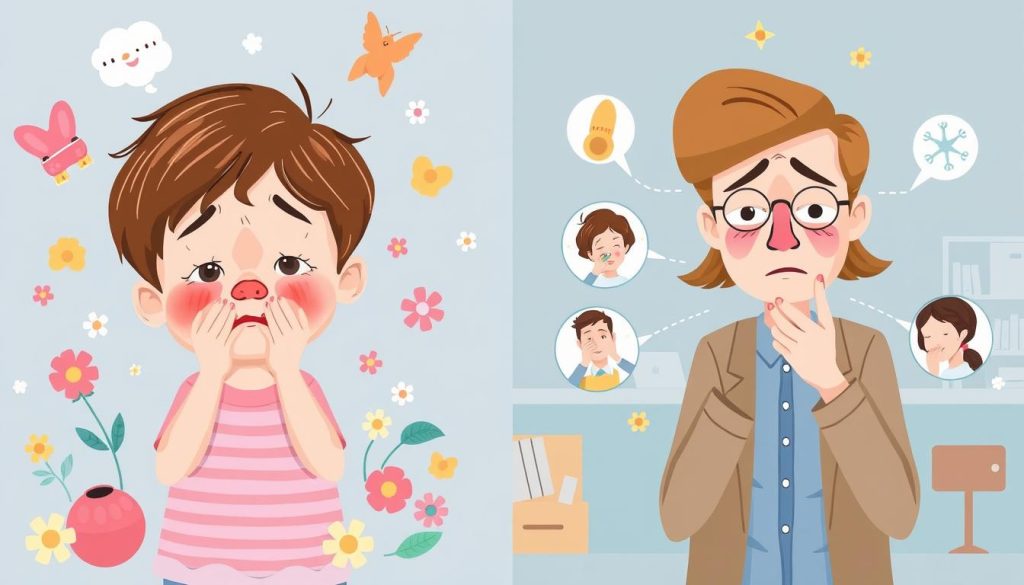
Below is a table showing common allergy symptoms in kids and adults. Knowing these can help decide the best allergy testing:
| Age Group | Common Symptoms | Typical Allergens |
|---|---|---|
| Children | Watery eyes, Skin rashes, Frequent sneezing | Pollen, Food products like peanuts, dairy |
| Adults | Persistent coughing, Sinus congestion, Severe headaches | Pollen, Animal dander, Various drugs |
It’s important to think about these differences when we test for and treat allergies. Early allergy testing is crucial for kids to avoid serious allergies or asthma. For adults, it helps them adjust their life or medicine if their allergies change or new ones appear.
Whether it’s seasonal allergies or food allergies, knowing how they show up in kids and adults helps us manage symptoms right away. It also helps us plan for their long-term health.
The Link Between Allergies and Asthma
Looking into the connection between allergies and asthma shows us how they can affect each other. This is especially true for allergen-induced asthma. Knowing how to manage this relationship is vital for those dealing with it. It can lead to better quality of life and control over symptoms.
Allergen-Induced Asthma
Allergen-induced asthma is triggered by common allergens like pollen, pet dander, and dust mites. When people with allergies breathe in these allergens, their airways can get inflamed. This leads to asthma symptoms. The first step in managing this asthma is to avoid these triggers.
Managing Asthma with Allergy Triggers
Controlling asthma often means managing environmental allergens well. Using allergy medications daily can help reduce asthma attacks caused by allergies.
For more on how allergies and asthma are connected, check out this informative page. It provides insights into treatments for both allergic reactions and asthma symptoms.
| Allergen | Common Occurrences | Management Strategies |
|---|---|---|
| Pollen | Spring and Summer | Stay indoors on high pollen days; use HEPA filters. |
| Pet Dander | Year-round in homes with pets | Regular pet grooming; keep pets out of sleeping areas. |
| Dust Mites | High in humid environments | Use allergen-proof bed covers; maintain low humidity. |
Knowing how specific allergens can trigger asthma is crucial. It shows the need for personalized allergy management plans. These plans might include specific allergy medications and lifestyle changes to avoid triggers. Being proactive in managing allergen-induced asthma is essential for better respiratory health.
Typical Allergy Skin Reactions
It’s important to know about skin reactions from allergies to get quick and effective allergy relief. These reactions can be very uncomfortable and affect your life a lot.
Contact Dermatitis and Allergic Reactions
Contact dermatitis makes your skin red, itchy, and inflamed. It happens when you touch something you’re allergic to. This is common in people who are around chemicals a lot, which is linked to environmental allergies. The first step to manage it is to know what irritates you and stay away from it.
Urticaria: Signs and Symptoms
Urticaria, or hives, is when your skin suddenly gets swollen, red, and itchy welts. It can be caused by many things, like food, medicine, or the environment. Finding the right allergy relief can help ease the discomfort, showing how important it is to understand this condition.
The table below shows the main differences between contact dermatitis and urticaria. Knowing these differences is crucial for managing and finding relief.
| Condition | Triggers | Symptoms | Relief Measures |
|---|---|---|---|
| Contact Dermatitis | Chemicals, metals, fragrances | Red, itchy, inflamed skin | Avoid triggers, topical corticosteroids |
| Urticaria (Hives) | Foods, medications, environmental factors | Swollen, red, itchy welts | Antihistamines, avoid known allergens |
For those dealing with allergy skin reactions, knowing the differences is key. It helps manage symptoms and makes daily life more comfortable. Allergy relief often means avoiding allergens and using over-the-counter meds.
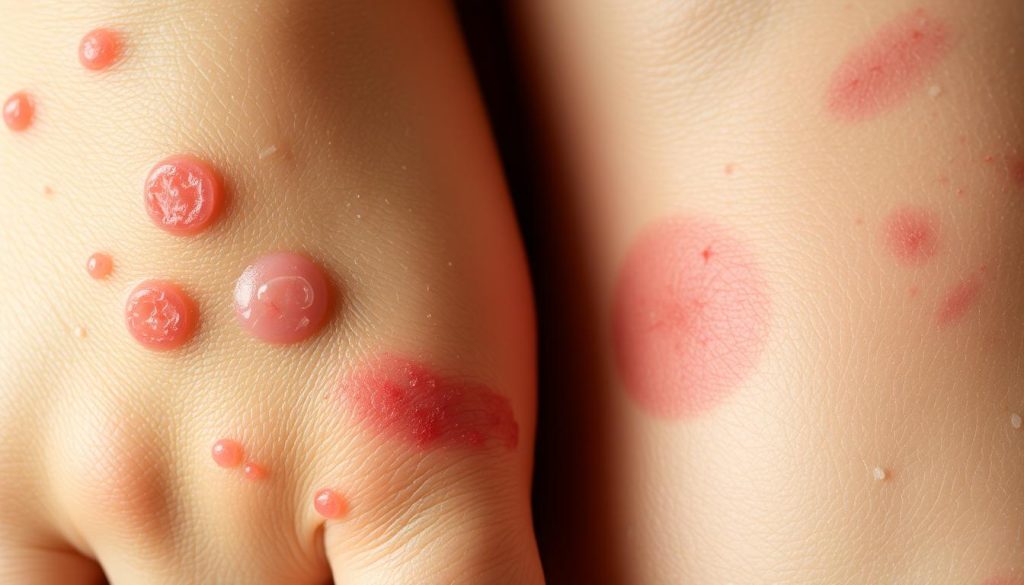
By tackling environmental allergies and other triggers, you can see big improvements. Getting help from a healthcare provider can give you specific advice and treatments that fit your needs.
Common Symptoms of Insect Sting Allergies
Getting an allergic reaction to insect stings is a big worry, especially in areas with lots of environmental allergies. Right after a sting, you might feel pain, see redness, swelling, and feel heat. These signs can get worse, making it key to prevent allergies.
For those very sensitive, symptoms can get worse. You might see hives, feel stomach cramps, or have swelling around your eyes, lips, throat, or tongue. In rare cases, it can lead to anaphylaxis—a serious condition that needs quick medical help.
- Local swelling and redness
- Intense itching or hives
- Difficulty breathing or shortness of breath
- Dizziness or a sharp drop in blood pressure
Knowing and spotting these signs fast is key to handling sting effects and avoiding serious health problems.
To help prevent allergies, it’s smart to:
- Stay away from places where stinging insects live during their active times.
- Wear clothes that protect you when you’re outside.
- Use insect repellents that work against the insects in your area.
- Keep your home area clean of trash and standing water to keep insects away.
These steps can lower sting chances and lessen the need for managing allergy symptoms. Knowing what to do right after a sting can save time and prevent a worse reaction. If you have a severe environmental allergy, having an epinephrine autoinjector and knowing how to use it is a good idea.
Staying informed and aware is crucial for those at risk of insect sting allergies. Talking to an allergist can help create a plan that fits your specific needs. This can make daily life better by focusing on allergy prevention and managing symptoms.
Allergy Symptoms that Mimic Other Conditions
In the complex world of health symptoms, it’s key to tell the difference between allergy symptoms and other common ailments. This understanding helps in choosing the right allergy testing methods and treatment strategies.
Distinguishing Allergies from Colds
Allergic reactions and the common cold share similar symptoms like a runny nose, sneezing, and congestion. But allergies often include itchy, watery eyes. These symptoms last in certain places or seasons. Colds, however, bring body aches and a general feeling of being unwell. They usually go away in a couple of weeks.
Allergy or Sinus Infection: Know the Difference
Sinus infections can look like allergy symptoms with nasal congestion and facial pain. But sinus infections have colored nasal discharge and sometimes a fever. These are not typical allergy symptoms. Knowing the difference is crucial for effective treatment and relief.
Figuring out between these conditions often needs a detailed symptom history and sometimes tests. Early and accurate identification is key. It ensures those affected can manage their conditions with more confidence and understanding.
When Allergies Become Severe: Anaphylaxis
Anaphylaxis is a severe, potentially life-threatening allergic reaction. It can happen quickly after being exposed to an allergen. Knowing the signs and how to react can save lives.
Most anaphylaxis cases are caused by food allergies, insect stings, medications, and latex. Food allergies are a big problem, leading to urgent medical situations.
- Difficulty breathing: Swelling in the airways can restrict airflow.
- Sudden drop in blood pressure: This can lead to dizziness or fainting.
- Severe skin reactions: Including hives and flushing.
When an anaphylactic reaction starts, giving epinephrine quickly is key. Epinephrine auto-injectors are lifesavers for those with severe allergies.
People at risk should wear medical alert bracelets. These bracelets show they might have an allergic reaction. It’s also important to see a doctor regularly and learn how to respond to anaphylaxis.
Being ready for emergencies can help avoid severe allergic reactions. Knowing about anaphylaxis helps keep everyone safe, especially those with severe allergies.
Long-Term Allergy Management Strategies
Managing allergies long-term is key to a better life and fewer symptoms. A mix of medicines, immunotherapy, and lifestyle changes helps a lot. Knowing these methods helps people manage their allergies well.
Pharmacological Allergy Relief
Medicines are a big help in fighting allergies. Antihistamines, decongestants, and corticosteroids are used to ease symptoms. For lasting relief, taking these medicines every day can make a big difference.
Immunotherapy for Persistent Allergies
Immunotherapy, like allergy shots and sublingual tablets, makes your body less reactive to allergens. It can make allergic reactions less severe over time. This is a big step towards managing allergies well.
Natural Remedies and Lifestyle Changes for Allergy Sufferers
Adding natural remedies and lifestyle changes to your routine can help a lot. Keeping your home clean, using HEPA filters, and eating foods that fight inflammation are good ideas.
It’s important to know how each strategy affects your allergies. Using a mix of these methods usually works best for long-term relief. Here’s a look at different allergy management strategies and their benefits:
| Strategy | Benefits | Duration |
|---|---|---|
| Pharmacological Treatments | Quick symptom relief | Short-term |
| Immunotherapy | Reduces sensitivity to allergens | Long-term |
| Natural Remedies | Enhances overall health | Continuous |
| Lifestyle Changes | Minimizes allergen exposure | Continuous |

Diagnosing Allergies: Symptoms Tests and Procedures
It’s important to know about allergy testing to diagnose and manage allergies. This part talks about the tests doctors use to find out what causes allergic reactions.
Skin Prick Testing for Allergies
Skin prick testing is a common allergy test. A small drop of an allergen is put on the skin, usually on the forearm. Then, the skin is pricked to let the allergen in.
This test is good at finding quick allergic reactions. These reactions show up as a wheal, a raised, red, and itchy spot, within 20 minutes.
Elimination Diets and Food Challenges
For food allergies, doctors might suggest an elimination diet or food challenges. The patient stops eating suspected allergens for 2-3 weeks. Then, they slowly add them back, watching for any signs of an allergic reaction.
This method helps find out which foods cause allergies. It makes sure the diagnosis is right and treatment works well.
Blood Tests for Allergen Detection
Blood tests are another way to find allergies. They check for allergy-related antibodies called immunoglobulin E (IgE). Tests like the Radioallergosorbent Test (RAST) and Enzyme-Linked Immunosorbent Assay (ELISA) are useful.
These tests are good for people who can’t have skin tests. This might be because of skin problems or because of medicines that affect skin test results.
Preventing Allergies: Steps to Reduce Exposure
Effective allergy prevention and allergy management strategies can greatly lower the risk of allergic reactions. This is especially true for environmental allergies. It’s important to take steps to avoid allergens to keep your environment safe and comfortable.
Here are some practical steps to reduce exposure to common environmental allergens:
- Regularly clean and vacuum to eliminate dust mites and pet dander.
- Use high-efficiency particulate air (HEPA) filters to trap allergens.
- Keep windows closed during high pollen seasons to reduce pollen in your home.
- Opt for hypoallergenic bedding and wash sheets weekly in hot water.
- Maintain low humidity levels indoors to inhibit mold growth.
Lifestyle adjustments also play a big role in allergy prevention. Here are a few recommendations:
- Avoid outdoor activities during peak pollen times, usually in the mid-morning or early evening.
- Wear a pollen mask when doing yard work or during high pollen counts.
- Choose easy-to-clean furnishings and avoid heavy drapes and excess carpets where dust and allergens can accumulate.
- Consider showering before bedtime to remove pollen and other allergens from your hair and skin.
- Stay informed about local air quality and pollen forecasts to better manage your outdoor exposure on high-risk days.
By following these strategies, you can reduce allergic reactions and improve your quality of life. Incorporating allergy management into your daily routine is crucial. It helps you live more comfortably and with fewer interruptions from allergy symptoms.
Allergy Medications: OTC and Prescription Options
There are many allergy medications to choose from. People with seasonal allergies can find relief with over-the-counter (OTC) and prescription options. Knowing the differences and uses of these medications is key to managing symptoms well.
Antihistamines and Their Role in Symptom Control
Antihistamines are a top choice for fighting seasonal allergy symptoms. They block histamine, a body substance that causes allergic reactions. You can find antihistamines in both OTC and prescription forms. They help with sneezing, itching, and runny nose.
Nasal Sprays and Decongestants for Relief
Nasal sprays and decongestants help with congestion from allergies. They reduce swelling in the nasal passages, making it easier to breathe. But, use nasal sprays carefully to avoid rebound congestion with long-term use.
Emerging Therapies in Allergy Treatment
New treatments like biologics are being developed. They target the immune responses involved in allergies. These new therapies could change how we treat severe allergies, offering hope for those who don’t respond well to traditional medications.
| Medication Type | Benefits | Considerations |
|---|---|---|
| OTC Antihistamines | Quick symptom relief, readily available | May cause drowsiness |
| Prescription Antihistamines | Targeted relief, higher potency | Requires doctor’s prescription |
| Nasal Sprays | Direct relief for nasal congestion | Potential for rebound congestion |
| Emerging Biologics | Addresses underlying immune response | Expensive, may not be covered by insurance |
Conclusion
Understanding allergy symptoms is key to managing allergies. Allergies can affect us in many ways, from sneezing in spring to indoor issues in winter. Knowing about these symptoms gives us control and power.
This article aimed to give you the tools to recognize and deal with allergies. We covered everything from seasonal to food allergies and the dangers of anaphylaxis. This knowledge helps you make smart choices about treatment and lifestyle changes.
We’re here to help and educate those with allergies. We’ve explored topics like allergy-induced asthma and treatment options. Our goal is to improve life for those with allergies. Remember, there are ways to manage and find relief from allergy symptoms.
FAQ
Q: What are common symptoms of environmental allergies?
A: Symptoms include sneezing, coughing, and itchy or watery eyes. You might also have a runny or stuffed nose and skin rashes. Reactions can range from mild to severe, depending on the trigger.
Q: How can I tell if my symptoms are due to seasonal allergies or a cold?
A: Seasonal allergies often cause itching, watery eyes, and sneezing. These symptoms come back around the same time each year. Cold symptoms, like body aches and fever, usually go away in a week to 10 days.
Q: What steps can I take to manage and prevent food allergies?
A: To manage food allergies, avoid known allergens and read labels carefully. Carry emergency medication like epinephrine auto-injectors. See a healthcare provider for advice and treatment options.
Q: Can allergies develop later in life, even if I wasn’t allergic as a child?
A: Yes, allergies can start at any age. The immune system can change, leading to new allergies. Always consult a healthcare provider if new symptoms appear.
Q: What is the role of allergy medications in managing symptoms?
A: Medications like antihistamines and corticosteroids help by reducing the immune response to allergens. They can ease symptoms like sneezing, itching, and congestion.
Q: How is allergen-induced asthma identified and managed?
A: Asthma is diagnosed by finding triggers and checking lung function. Management includes avoiding allergens, using medication, and sometimes allergy shots.
Q: When should I seek medical help for an allergic reaction?
A: Seek help immediately for severe reactions like anaphylaxis. Symptoms include trouble breathing and swelling. For less severe reactions, see a healthcare provider for guidance.
Q: What are some natural remedies and lifestyle changes that can help with allergy relief and prevention?
A: Try saline nasal rinses, air purifiers, and staying hydrated. Local honey may help build immunity to pollen. Keep windows closed during pollen seasons and wear a mask while doing yard work.
Q: Are there different tests and procedures to diagnose the type of allergy I might have?
A: Yes, tests include skin prick testing and blood tests. Elimination diets can also identify food allergies. Your healthcare provider will recommend the best tests for you.
Q: Is immunotherapy an effective treatment for allergies?
A: Immunotherapy, like allergy shots, can help by gradually desensitizing the immune system. It’s a long-term treatment that aims to reduce reactions and medication use over time.













